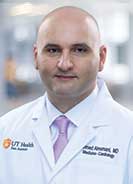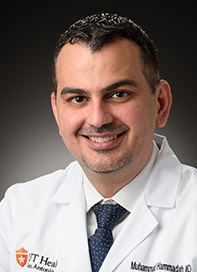TAVR Treatment in San Antonio
If you have aortic stenosis, symptoms such as fatigue, shortness of breath and chest pain are likely part of your daily life. Now, an advanced and minimally invasive option is available for most patients with aortic stenosis. This catheter-based procedure, or transcatheter aortic valve replacement, is commonly called a TAVR procedure.
The Aortic Valve Clinic and Heart Center is your comprehensive resource for cardiovascular care, including heart valve repair and replacement therapies like TAVR.
Learn more about our team of specialists at the Aortic Valve Clinic and Heart Center.
What Is TAVR?
The TAVR procedure uses a catheter to replace a narrow heart valve that fails to open properly. This helps restore blood flow from the heart to the rest of your body.
TAVR is minimally invasive, meaning there will be no large incision made near your heart. Instead, the cardiologist will guide a catheter up your leg to the heart. The new TAVR valve is then placed inside the narrow aortic valve and slowly released and deployed.
Echocardiogram and fluoroscopy are used to confirm valve placement. Most TAVR procedures at University Hospital are done with moderate sedation without the need for general anesthesia.
University Health performs both traditional and advanced TAVR procedures. This includes treating previously placed and malfunctioning surgical valves and the use of alternative access like transcarotid and transcaval TAVR. This allows more patients, even patients with severe peripheral vascular disease, to be treated with TAVR as an alternative to open-heart surgery.
Benefits of TAVR
- Shorter hospital stay, as most patients go home within one to two days
- Faster returns to normal activities, often less than a week
- Improved patient outcomes and quality of life in patients who are at high risk for surgery
- Ability to do the procedure with minimal sedation in many cases, avoiding intubation and general anesthesia
Who Qualifies for TAVR?
If you are diagnosed with aortic stenosis, you might be a good candidate for the catheter-bases device with TAVR.
During your visit to the Valve Clinic, we will perform a full evaluation to determine if TAVR is right for you, including:
- Echocardiogram of your aortic valve
- Computed tomography (CT) angiogram
- Coronary angiography
- Assessment of any existing conditions
Preparing for TAVR Procedure
Your heart team will provide you with information about how to prepare before your TAVR procedure.
On the day of your procedure, you may be encouraged to bring:
- A list of all medications and supplements you take
- Personal hygiene items you’d need for an overnight stay (toothbrush, razor, shaving cream, etc.)
- Items to keep you entertained, like a book or headphones
You may be asked to avoid wearing:
- Contact lenses, glasses
- Dentures
- Jewelry
Learn more about what to expect during your hospital stay.
Recovery, Outcomes and Results
After your procedure, you will spend one to two nights in the hospital before you are discharged home.
To ensure the best outcome and that the procedure works properly, we ask that you make some heart-healthy lifestyle adjustments, including:
- Quit smoking (learn about our smoking cessation program)
- Eat plenty of fruits and vegetables
- Limit your intake of salty foods, saturated and trans fats
After the procedure, you should expect to see some improvement in your aortic stenosis symptoms and have a better quality of life. You’ll have more energy, be able to breathe better and not get fatigued or dizzy during exercise and activity.
TAVR San Antonio
University Health Cardiovascular Center, in conjunction with UT Health San Antonio, was the first center in San Antonio to offer this innovative therapy, and among few centers in the country to participate in the original clinical trials that led to TAVR approval.
Our experts have extensive experience in TAVR, and University Hospital is one of the only health systems in the region to offer the full spectrum of advanced TAVR options (Valve-in-Valve TAVR, and alternative access TAVR). Our team offers patients the highest level of expertise and care to ensure excellent outcomes.



